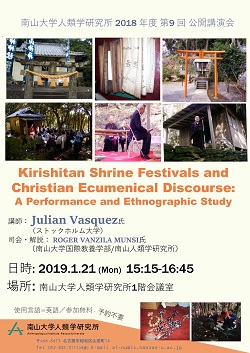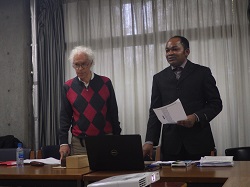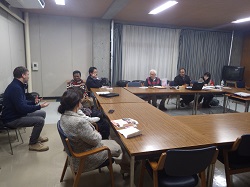研究活動 活動報告
第9回公開講演会「Kirishitan Shrine Festival and Christian Ecumenical Discourse」実施
2019年01月21日
[日時]2019年1月21日(月)、15:15~16:45
 |
| ポスターをダウンロード |
[会場]南山大学人類学研究所1階会議室
[講師]Julian Vasquez(ストックホルム大学)
[司会・解説]Roger Vanzila Munsi(南山大学国際教養学部/人類学研究所)
[使用言語]英語
[講演要旨]
The basic purpose of this project is to explore the Kirishitan Shrine Festival and their related Christian ecumenical aspects from the performance and ethnographic perspectives. We focus more specifically on the question of how the concepts of indexicality, negotiation, the presence of social energy, and the issue of ecumenism are articulated in this specific religious setting. The study therefore provides some clues that can guide further discussion and understanding of the crisis facing this particular religious performance since 2017.
[報告]
The Nanzan Anthropological Institute (NAI) Workshop, held on 21 January 2019, brought together 15 researchers from six countries: America, Australia, Congo DRC, Germany, Japan, and Sweden. The workshop was structured around a one hour facilitated presentation and comments to allow all participants to enter into practical discussion. There was input from a key speaker, Associate Prof. Julian Vasquez from Stockholm University, who provided insights into the Kirishitan Shrine Festivals and Christian Ecumenical Discourse from the performance and ethnographic perspectives. During the presentation, Associate Prof. Roger Vanzila MUNSI frequently intervened for clarification and crucial comments.
Although some seemingly incidental references were made to Kirishitan Shrine Festivals in Nagasaki settings, Prof. Vasquez's presentation focused more specifically on Karematsu Shrine Festival (held annually on 3rd November) to highlight its basic aims and its historical evolution from 2000 until the crisis it experienced in 2017. The synthesis showed that the crisis was due to the local Catholic priest's stance and wrong or simplistic interpretation of the Code of Canon law (precisely canons 932,1#; 387; 838,4#; 392) guiding the Roman Catholic Church.
From the standpoint of performative theory, it was consequently clear that the indexicality of the festival as observed until 2016 is no longer working. The continuity of this valuable festival therefore requires first of all a new negotiation between parties. This, according to Prof. Vasquez, implies the particularly intriguing question of how its script and involved indexicality should be understood and conceptualized. Secondly, the issue of power over decision-making within the respective faith-based communities should be seriously taken into consideration.
As in so many religious festivals, Prof. Vasquez pointed out that the concept of indexicality is an important way of understanding how the social energy of faith-based communities can circulate positively. This is partly because it does not seek to ignore differences. Through a sincere negotiation of the indexicality of the festival the social subjects can create a relevant script. In so doing, they can achieve a better understanding and mutual respect, and hence can live in social and religious harmony.
Ecumenism, as an interreligious dialogue, recognizes that people from different faiths and traditions can work together towards greater unity and at the same time preserve their own traditional faith and practice. Here Prof. Vasquez's contention was plain: By being involved in ecumenism, therefore, Karematsu Shrine festival participants will be able to celebrate their diversity while re-embracing their historical bonds in a decided urban setting.
The discussion session helped participants to further the current issue of the Karematsu Shrine Festival and its relationship to the religiosity of the local community. Participants also had the opportunity to share their field experiences and to learn from one another as they discussed good models and paths that could enhance the Karematsu Shrine Festival against the backdrop of the current Christian Ecumenical Discourse.
The workshop was a key activity of the NAI as part of its 2018-2019 collaborative research on the two main themes of "Home" and "Social organization". Feedback from the workshop was very positive. Participants saw great value in combining a performance theory and ethnography in the study of the Kirishitan Shrine Festivals and Christian Ecumenical Discourse. The outcomes of this micro-analysis sounds exciting and interesting. The next workshop on the same topic will be held in Sweden in 2020. Meanwhile both Professors Julian Vasquez and Roger Vanzila Munsi will publish a journal article on the facet of this intriguing subject to get some feedback from other researchers. Towards this end, Professors Julian Vasquez and Roger Vanzila Munsi are developing a new collaborative research project and publication on Kirishitan Shrine Festivals and Christian Ecumenical Discourse. A Performance and Ethnographic Study, which will take the form of an interdisciplinary, peer reviewed, edited book to be published in 2021.
 |
 |
| Vasquez氏(左)と司会のVanzila氏 | 会場の様子 |